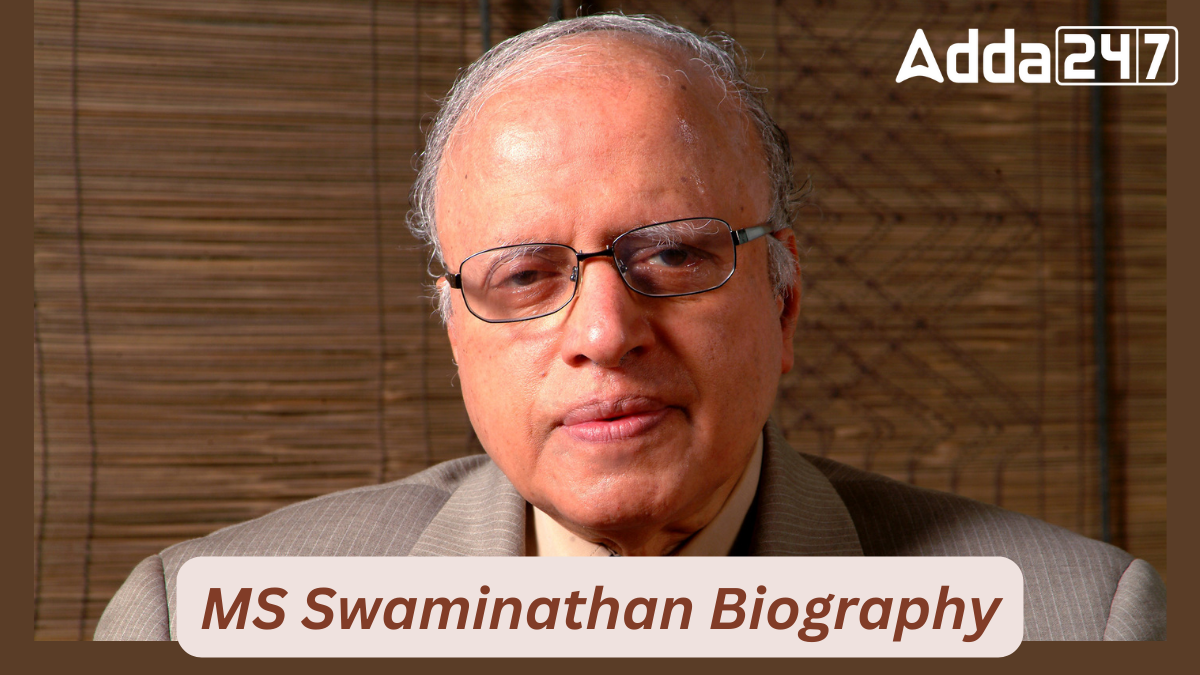Mankombu Sambasivan Swaminathan, born on August 7, 1925, and passing away on September 28, 2023, was an eminent Indian agronomist, agricultural scientist, plant geneticist, administrator, and humanitarian. Often referred to as the “Father of the Green Revolution in India,” Swaminathan’s pioneering work revolutionized agricultural practices and significantly contributed to global food security.
Key Details About MS Swaminathan
| Date of Birth: 7th August 1925 |
| Place of Birth: Kumbakonam, Tanjore District, Madras Presidency, British India |
| Parents: M.K. Sambasivan and Parvati Thangammal Sambasivan |
| Spouse: Mina Swaminathan |
| Children: 3 |
| Other Name: Father of Green Revolution |
| Death: 28th September 2023 (age of 93) |
| Place of Death: Chennai, Tamil Nadu, India |
MS Swaminathan – Early Life and Education
Born in Kumbakonam, Madras Presidency (now Tamil Nadu), Swaminathan grew up witnessing the challenges faced by farmers during fluctuations in crop prices and devastating weather conditions. Despite familial expectations to pursue medicine, Swaminathan was deeply moved by the Bengal famine of 1943 and decided to dedicate his life to agricultural sciences. He earned his undergraduate degree in zoology from Maharaja’s College, Trivandrum, and later pursued agricultural science at the University of Madras.
MS Swaminathan – International Academic Pursuits
Swaminathan’s academic journey took him to prestigious institutions worldwide. He conducted research in genetics at the Indian Agricultural Research Institute (IARI) before studying at Wageningen Agricultural University in the Netherlands and the University of Cambridge in the United Kingdom. His research in potato cytogenetics and wheat genetics laid the groundwork for his groundbreaking contributions to agriculture.
Leadership of MS Swaminathan in Agricultural Innovation
Upon returning to India in 1954, Swaminathan embarked on a mission to revolutionize agricultural practices. Collaborating with Nobel laureate Norman Borlaug, Swaminathan spearheaded the introduction of high-yielding wheat and rice varieties, leading to the Green Revolution in India. His efforts helped avert famine-like conditions and significantly increased food production, making India self-sufficient in food grains by 1971.
MS Swaminathan – Institution Building and Advocacy
Swaminathan’s leadership extended beyond scientific research. He served as Director-General of the Indian Council of Agricultural Research (ICAR) and played pivotal roles in the Planning Commission and the International Rice Research Institute (IRRI) in the Philippines. He advocated for the integration of women and environmental concerns in agricultural policies, reflecting his commitment to sustainable development.
Personal Life of MS Swaminathan
Swaminathan’s personal life reflected his commitment to humanitarian causes. He was married to Mina Swaminathan and had three daughters. He remained actively engaged in philanthropic endeavors, establishing the M.S. Swaminathan Research Foundation to promote sustainable agriculture and rural development.
Legacy and Contributions
Swaminathan’s legacy extends far beyond scientific achievements. He chaired the United Nations Millennium Project on hunger and was instrumental in formulating policies to address food security challenges globally. His advocacy for sustainable agriculture and social justice continues to inspire generations of scientists and policymakers worldwide.
MS Swaminathan – Awards
Here is the list of awards received by MS Swaminathan:
- Mendel Memorial Medal – 1965
- Ramon Magsaysay Award – 1971
- Albert Einstein World Science Award – 1986
- World Food Prize – 1987
- Tyler Prize for Environmental Achievement – 1991
- Four Freedoms Award – 2000
- Planet and Humanity Medal of the International Geographical Union – 2000
- Order of the Golden Heart of the Philippines
- Order of Agricultural Merit of France
- Order of the Golden Ark of Netherlands
- Royal Order of Sahametrei of Cambodia
- Award for International Co-operation on Environment and Development
- Artwork of Swaminathan in Dr. Norman E. Borlaug Hall of Laureates
- Building and scholarship fund named after him by IRRI
- Shanti Swarup Bhatnagar Award – 1961
- Padma Shri
- Padma Bhushan
- Padma Vibhushan
- H K Firodia award
- Lal Bahadur Shastri National Award
- Indira Gandhi Prize
- M.S. Swaminathan Award for Leadership in Agriculture – 2004
- Bharat Ratna – 2024
Important Questions Related to Exams
Q1. When was M.S. Swaminathan born?
Q2. What is another name for M.S. Swaminathan?
Q3. Where did M.S. Swaminathan earn his undergraduate degree?
Q4. Who did M.S. Swaminathan collaborate with to introduce high-yielding wheat and rice varieties in India?
Q5. What is the name of the institution established by M.S. Swaminathan to promote sustainable agriculture?
Check your knowledge and try to answer the questions in the comment section.




 T20 World Cup Winners List from 2007 to ...
T20 World Cup Winners List from 2007 to ...
 Which Vitamin is Found in Bananas? Check...
Which Vitamin is Found in Bananas? Check...
 Which Glacier is known as the 8th Wonder...
Which Glacier is known as the 8th Wonder...








